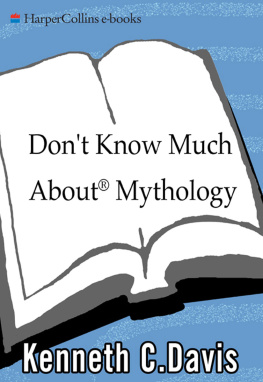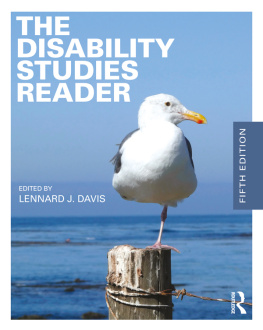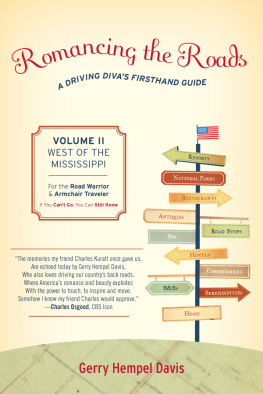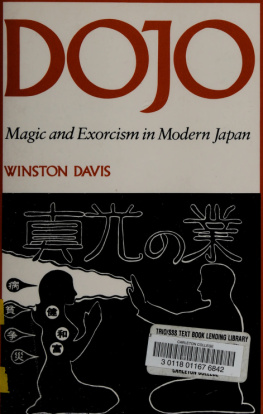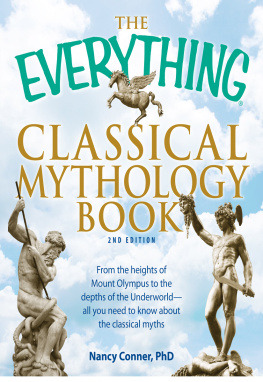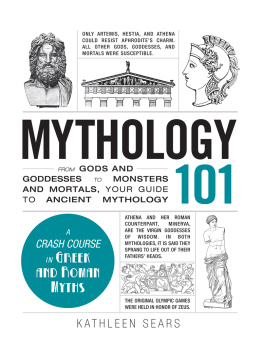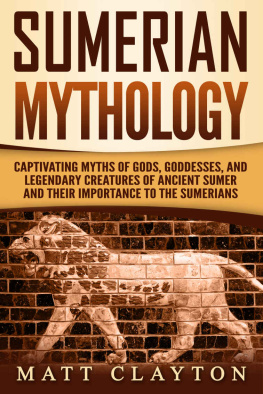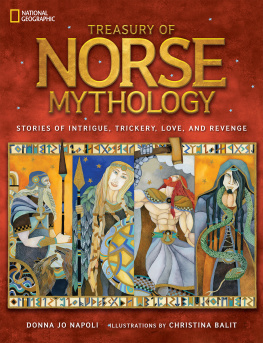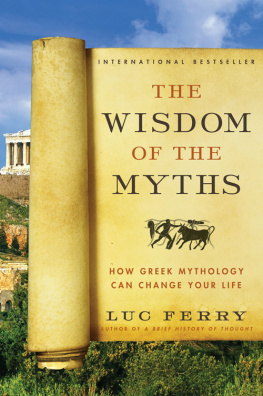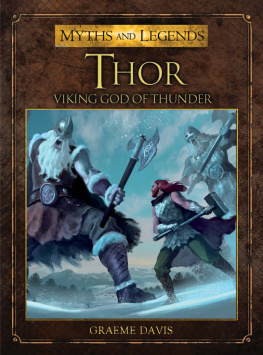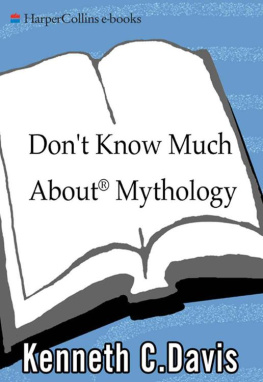Everything You Need to Know About the Greatest Stories in Human History But Never Learned
Kenneth C. Davis
I want to know what were the steps by which men passed from barbarism to civilization.
V OLTAIRE
Throughout the inhabited world, in all times, and under every circumstance, the myths of man have flourished; and they have been the living inspiration of whatever else may have appeared out of the activities of the human body and mind.
J OSEPH C AMPBELL ,
The Hero with a Thousand Faces
We have not met our forgotten ancestors, but we begin to sense their presence in the dark. We recognize their shadows here and there. They were once as real as we are. We would not be here if not for them. Our natures and theirs are indissolubly linked despite the aeons that may separate us. The key to who we are is waiting in those shadows.
C ARL S AGAN and A NN D RUYAN ,
Shadows of Forgotten Ancestors
I n the olden daysthat seems like a good opening for a book about mythswhen I was about eleven years old, I could not sit still at my fifth-grade desk. I squirmed. I fidgeted. My mind wandered. Oh, I tried, but I didnt remember much of anything I was supposed to learn. Except that at the end of each day, as the clock on the wall ticked slowly toward three oclock and freedom, I would sit like a stone in anticipation of those few minutes before dismissal when our teacher set aside the math and science to read aloud from the Odyssey .
Magically connected over the vastness of centuries to the people who heard these tales once sung around campfires, I was captivated. Instead of fighting fractions and verbs, I was aboard a ship, sailing mythical oceans, battling witches, demons, and one-eyed monsterstrying to find my way home with brave Odysseus, the wily hero of Homers epic.
Those daily doses of this great Greek story made my day, gave me a taste for literature and poetry, and certainly whetted my appetite for more mythology. When I had a chance, I would spend hours in the school library, devouring books about the mythsand not just the classics of Greece and Rome. I read about Norse gods such as Thor and the trickster Loki, and the Egyptian gods who inspired the pyramids. There was Sigurd slaying the mighty dragon Fafnir, and the fearsome Celtic hero Cuchulainn single-handedly battling hundreds of enemies in showers of gore that might make Arnold Schwarzenegger wince. I had discovered a whole new world. It was a world of gods, heroes, monsters, and legendsand it was a lot more interesting to me than school!
A few years later, my first job was delivering the Daily Argus , the local newspaper in my hometown of Mount Vernon, New York. By all accounts, I was a curious boy, so I wanted to know what argus meant. I soon discovered that in Greek mythology, Argus was a monster whose body was covered with eyesexactly how many eyes he had depends on the source; some say four, some say a hundredbut only two of his eyes ever closed at any one time.
Argus played a supporting role in a tale about Zeus, the randy lord of the gods, and Io, the daughter of a local river god. She was just one of the many womenmortal and divinedesired by the seemingly insatiable Zeus. To conceal his dalliance with Io from his jealous wife, Hera, Zeus transformed the young maiden into a snow-white heifer. But Hera was no dummy when it came to Zeus and his philandering ways with nubile young women. Like some Olympian Alice Kramden of The Honeymooners always foiling Ralphs best-laid plans, Hera saw through Zeuss attempted ruse. To get back at her seemingly sex-addicted, cheating husband, Hera claimed Zeuss pet heifer for herself. Hera had Io placed in chains and then set the ever-watchful Argus to guard over her youthful rival.
Zeus didnt give up so easily. He struck back by sending the god Hermes to lull Argus to sleep and free Io. In one version of the story (many Greek myths have variations), Hermes tried to put Argus to sleep by playing on his magical pipe, but that didnt work. So he bored Argus to sleep with a long, tedious storythen cut off his head. To honor Argus, the grieving Hera placed his many eyes on the tail of her favorite bird, the peacockand thats why the peacocks tail looks the way it does. Hera, however, wasnt finished. Poor Io, still in the form of a heifer, was freed. But Hera just tormented Io with a gadfly that drove her, itching madly, on a wild gallop across Europe and Asia until she finally dove into the sea (the Ionian Sea, which is named for her). Io swam to Egypt, where Zeus returned her to human form and she bore what the tabloids call a love child. But thats another story. With the Greeks, theres almost always another story.
For me, the link between the monstrous Argus and the newspaper I carried every day was now clearour local daily was supposed to be the ever-watchful eyes of the community. Im not sure how accurate that was, but I did become a newspaper junkie from about that timeand this connection between a commonplace, everyday item like a newspaper and ancient myths just made me love the subject all the more.
Myths continue to fascinate meand millions of others. Only most of us dont call it mythology. We like to call it going to the movies. For instance, on a cold Vermont night a few years ago, I went to see the second installment in The Lord of the Rings trilogy with my two teenagers and another friend. We were lucky to get tickets, as they sold out quickly. As we took our seats, people were scrambling futilely to find places, and I envisioned one of my worst personal fears: a raucous crowd of kids on Christmas break talking throughout the show.
But as soon as the lights went down, the extraordinary occurred. There was complete silence in this small Rutland theater. When the nearly-three-hour-long movie was over, the silence continued for a moment. And then the crowd exploded with loud and sustained applause.
There was some debate among the legions of Tolkien lovers about the faithfulness of these screen versions to their source. (Confession: I was one of those die-hard fans. When I was fourteen, I read all three books straight through while on a sick leave from school, which I extended a few days beyond the illness.) Merits of the film aside, I was struck at how reverent the audience was.
Chances are, a good many people in that audience were not churchgoers, and sitting in this darkened theater may have been as close to some form of collective spiritual encounter as any they might ever have experienced. And I thought further that this experience probably connected this twenty-first-century collection of strangers back to something much deeper, the act of sitting around a campfire three thousand years ago as someone recounted timeless exploits of heroes and monsters, Good versus Evil.

